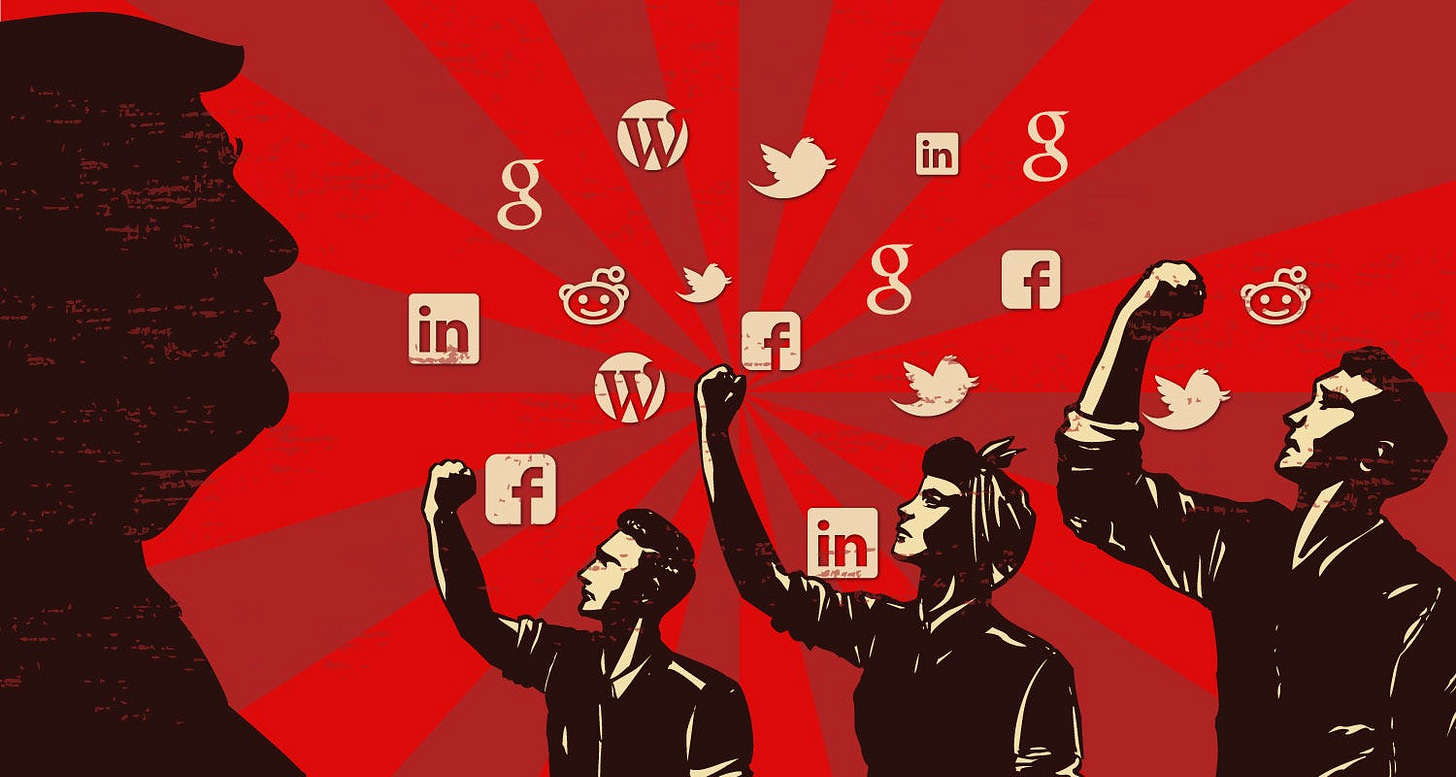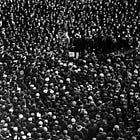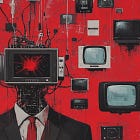The Destructive Effects of Propaganda on Society, Politics, and the Christian Faith
The transformation of our society into a mass society dependent upon propaganda has changed us, changed the nature of religious belief and the political. Let's take a look at how.
This piece will bring to a close our deep dive into Jacques Ellul’s seminal work, Propaganda: the Formation of Men’s Attitudes. As we have talked about throughout this series, one of the common misconceptions about propaganda is that it is primarily geared towards getting you to believe things that are not true. We have the false idea that if we can just cut through or expose the lies of the media that we will be able to free people from the grips of propaganda. The struggle with propaganda is the struggle for the truth we are told. But that is not what propaganda is, or how propaganda works, nor is that the purpose of propaganda. Propaganda is biased towards action and doing. To the extent that your thinking is being shaped, its purpose is to direct your actions. Better yet, your thinking changes to justify the actions you have taken at the behest of the propagandist.
For the most part, much of the propaganda you immersed in is directed towards your integration into and willing participation in our mass market, mass media, mass politics, mass religion society driven by technology and money. As community was broken down to create mass society, propaganda was needed to fill the role that these real communities used to play in our lives. In this previous era, which is most of human history, our culture was given to us organically by the people who surrounded us and the place where we lived. Today, propaganda shapes our culture. Propaganda is our culture. But because propaganda uses what was once imparted to us naturally, abstracting and rationalizing it, turning it into a means of control, most people in a mass society no longer have beliefs of their own passed down to them as the part of the traditions of their people and region in which they live. Instead, their thoughts are all given to them as an ideological construct meant to homogenize them and integrate them into mass society so as to regulate and control their behaviours.
“Society rests on certain beliefs and no social group can exist without such beliefs. To the extent that members of a group attribute intellectual validity to these beliefs, one may speak of an ideology.”
It is useful for us to think about society as operating at different levels. On the surface, there are things like advertising for products, political advertisements or even stuff like DEI workshops. These are the top level, surface messaging and they are the most easily mutable and changeable. But beneath these lies a deeper level, that of the system itself. For example, DEI messaging may be getting pulled out of the schools and is disappearing from corporate advertising, but no one is questioning the role and purpose of the public school, or even the idea of what we might call “industrialized” or “institutionalized” schooling itself, regardless of whether it is the state school or a private school. The idea that you must be schooled in this context lays beneath any debates about curriculum. So too advertising. We might have criticized Bud Light for using a transgender spokesperson, but beneath that there is the whole foundation of a consumer culture. If you are arguing about the content of advertisements, you are not arguing about whether or not you should be subjected to product advertising in the first place.
It is important to see that in the era of mass communication, we don’t really question the mass society and with it mass communication. We tend to focus our attention upon the ends, the messages being conveyed by the means of technologically enabled mass communication, and not the deeper structures which support and drive the surface epiphenomenon. Over time, the ends become more important than the means, which are take for granted and largely ignored. But, argues, Ellul, this is a mistake when it comes to producing effective propaganda. The tactics are more important than the political ends towards which they are put. There has been a recent debate in our sphere about whether the woke is being put away or not. What Ellul is saying is that it does not matter whether “the woke is put away” or not, because the messaging mediums remain firmly in place. Ellul tells us that tactics are more important than their political ends. This is similar to Marshal McLuhan’s “the medium is the message.”
“The new propaganda methods have completely changed the relationship between propaganda and ideology, and as a result the role of and value of ideologies in the present world have changed. Propaganda’s role is less and less to propagate ideologies; it now obeys its own laws and is autonomous.”
What Ellul is saying is that the point of propaganda is that you are propagandized. The content no longer really matters as much as the reality that you are and must remain completely shaped by propaganda.
“Propaganda no longer obeys an ideology. The propagandist cannot be a ‘believer.’ Moreover he cannot believe in the ideology he must use in his propaganda.”
Whether you are pushing DEI messages or MAGA messages should be irrelevant to the propagandist. Right wing propaganda and left wing propaganda are both propaganda. They are the same thing and have the same effects, positive and negative, on the propagandized. The nature of propaganda and the technical system render surface differences in ideology ephemeral. Left wing ideology and the policies it produces are only superficially different from right wing ideology and the policies it produces. It is all propaganda. It is all technocratic management. The role of the propagandist is to believe in propaganda. The role of the policy maker is to believe in the power of policy itself to change things. In the same way, the advertiser needs to believe in the power of advertising. Whether he is crafting a campaign to sell cigarettes to you or to preach the dangers of smoking to your health is irrelevant. All that matters is that it is effective propaganda. The true propagandist must have contempt for any and all ideologies, because he knows that actually believing in your message makes his propaganda less effective. Whether a teacher is teaching DEI or the neutral society, or the glories of the past, the teacher must believe in schooling. The content is irrelevant. The medium is the message.
At its heart, propaganda is not about creating and sustaining orthodoxies; rather it is about transforming people into militants in service to orthopraxis. Politically, the true goal is your participation in the political system, not in any one particular set of policy proscriptions or in service to a particular ideology or party. Do you participate in politics? This is more important than which party or ideology you profess. In this regard, propaganda is about effectiveness. “Does it work?” is the only question that matters. And it should always be focused on mobilizing people towards the deeper purposes of the technological society itself. The ideology does not matter as long as people are mobilized in support of power, in support of the system itself. If that means supporting Democrats, so be it. If supporting Trump keeps people aligned with the broader purposes of the system, then the effective propagandist should be able to deftly pivot with ease. The only goal is how effective it is in getting you to participate in the societal system of modernity.
In this regard, ideology becomes an obstacle to propaganda. Ellul gives the example that the ideology of popular sovereignty gets in the way of a transition to a dictatorship if that is the most effective. Being able to pivot in such a way to preserve the overall societal system of the mass technological society should be more important than the particular political formula operative in the moment. The ideology must function like magic words — the classic today being “our democracy” — all while the public is oblivious to the contradictions between the words being used on the one hand and the actions being asked of them on the other, which is usually obedience of some form. Thus words like “democracy,” or “patriotism,” or “country,” or “social justice,” are all used to spark a reaction. There is no real commitment to their content. They are mere epiphenomena. The content can change depending on who is speaking the magic words and for what purpose they are being spoken. Ideology is not supposed be deep, like a myth. Ideology is supposed to be free from any mythic anchoring in humanity’s great primal archetypes. The ideologue is attempting to shape and manipulate a materialist world. He is not looking to conform actions to the deeper metaphysical realities. Thus ideology is meant to be ephemeral, adapting and conforming itself as needs be towards what is the most effective. Its only purpose is to ensure that mass man acts properly in accord with the needs of mass society. It is his participation in the technological society which matters. If democracy is the best vehicle in the moment to achieve this, so be it. But if a dictatorship becomes more effective, he must pivot his propaganda seamlessly to this new reality.
This creates a problem for the Christian in relationship to the broader mass society. His beliefs are anchored in a deep mythos and a long tradition. They are metaphysical, archetypal, and true. They are supernatural and mystical. But, because of this, they serve no purpose in the mass society and cannot be used by the propagandist because they lack utility and mailability. And so, to make Christianity useful for the modern era it must be shorn from the mystical, the metaphysical and archetypal to become rationalized and practical. It is about words and their meanings. It is about building institutions. Christianity becomes a system for building the good life and building a healthy productive society. The “Protestant Work Ethic” emerges as an expression of this practical discipline. Christianity in modernity has been rendered into a form where it is amenable to being ideologized. Thus, like words such at “patriot” and “country” and “liberty” and “freedom” we now spend our time arguing over the meaning of words like “Christian love” or “grace” or “salvation.” Christianity becomes rendered into a form that is usable for modernity and the propagandistic mass society.
Ideology differs radically from “myth” — here Ellul is using the more academic sense of myth that can include the deepest and most profound stories. Not myth as in “made up” but rather myth as in “reveals the deepest, most profound realities to us” — in that ideology has no roots and no relationship with the deepest, most profound, even primal archetypes. This ideological transformation of the mystical and the metaphysical creates a simulacrum of real connection to God and the deeper unseen truths without its reality. One is enframed in the construct that is the technological society. This is not to say that there is nothing real to you your faith, its just that for the most part, rather than seeking that deeper mystical and metaphysical connection, you operate mostly in realm of constructed reality. This is a phenomenon that is experienced across western Christianity. There are degrees and there are differences, but whether it is the constructed realities of ritual or the constructed realities of theology, much of our experience of the Christian faith is mediated through realities that have been rendered useful for propagandistic manipulation. Because of this, man now acts in accordance with impulses from propaganda, and not those that emerge naturally and organically from the substrate of myth, story and the metaphysical. This is one of the main reasons that I have argued for a revival of the mystical tradition in western Christianity, especially in its Protestant branches.
We have to understand that these changes to the Christian faith came because people were acting a certain way. Action shapes thought and not the other way around. Because people were already acting in a certain way, in a way cut off from deeper spiritual realities, they then conformed the surface phenomenon of the faith to accord with this new way of living, thus giving birth to ideology and transforming their previous beliefs into an ideology that was more suitable for the actions they were already wanting to take. Justification is an essential function of propaganda. It removes the cognitive dissonance one feels when one’s life is no longer aligned with the deeper metaphysical realities. Ideology is then transformed into principles that mimic myths. Thus the pursuit of happiness as a goal, an end in life, no longer seems like the revolutionary idea that it is, but rather something that is a “self-evident truth.” But it can only exist this way when one is already cut off from the deeper metaphysical reality that happiness is a byproduct of pursuing virtue, pursuing a deep connection with God and his ways. When propaganda begins to use the form of doctrine, it destroys it. Emptied of its implicit connection with metaphysical reality, it can mean at once anything and everything. It is now ready to serve the demands of the constructed reality that is modernity. Soon, all that is known and accepted as knowledge is the product of things promulgated by propaganda. This includes scientific knowing, which was, early on, severed from metaphysical realities to answer the question of how things work and how they can be made useful rather than what they mean.
As we enter fully into the world of propaganda, you no longer really interact with each other. Every interaction is mediated to you by technique, by the machine, by the propagandist.
“There is action, but no interaction.”
The more propaganda there is, the more that different people and groups within society become partitioned off from each other. Propaganda suppresses conversation. There are only enemies. You don’t actually converse with anyone. It is a world of closed minds where people talk to themselves and at other people but not with them.
Public opinion is formed through abstraction, by fixating upon selected points of reality, framing them and crystalizing them in the minds of the people. Thus new conceptual realities are created and everything else will crystalize around them. The details and the nuance will disappear. Connection with deeper, more grounded metaphysical realities are non-existent. The ideas of propaganda become monolithic and myth-like without having any connection to the power of the realities that generate the fundamental mythological and archetypal realities. This is how the idea of “class” emerges. It is largely an abstraction that is loosely based on reality, the seed of what will become a form of propaganda so powerful that it coalesces into a system of belief that eliminates all deviant ideas and explanations. Thus “class consciousness” is the product of propaganda. It is not an organic reality. There really is no such thing as “class.” The power of propaganda is that it simplifies reality and makes every subsequent round of propaganda built off the first propaganda easier to produce, shape and get it to take hold in the actions and minds of the mass.
Propaganda seeks to reduce all attitudes down to two basic responses: a positive or a negative. Thus everything is driven towards polarization. You are for or against it. Everyone is friend or enemy. Everything a struggle between good and evil. These simple binaries allow the propagandist to divide the world between the public and the private. The world of the public becomes valued and the world of the private diminishes in importance. Conveniently, one’s deepest held beliefs, those things that are based on deep mystical and metaphysical realities, are relegated to the private sphere. Only that which can be used by and converted into propaganda makes it into the ever increasing realm of the public. Propaganda seeks to sever the bond between the two spaces, so that private beliefs are given no purchase in the public realm. You are told that this public arena is neutral. This has the effect of diminishing and fragmenting private voices, making them seem uncertain and lacking cohesion. Propaganda wants big, monolithic ideas that can unify the masses. Mystery and the metaphysical struggles to gain purchase in this context.
And so you enter into the public realm, a space severed from your beliefs, where you are pressured to act a certain way. The goal is always to force your actions into a broad public conformity so that you act in conjunction with others in the mass, but not organically and spontaneously, but rather at the behest of the propagandist. Even if that action is verbal, that is, repeating the right phrases and incantations dutifully. “Diversity is our strength.” “All people are created equal.” “Everyone should be free to make their own choices.” There are dozens of these you could list. Action determines attitudes. It is like product advertising. The goal is to get you to buy the product. Political propaganda is the same. They want you to go out to the store and participate by buying the product. This shared action re-integrates the isolated, deracinated person through group action. Mass society isolates people and makes them withdraw from each other. Propaganda reconnects them. The group, though, is now no longer capable of self-reflection. This unification through propaganda becomes a unifying truth, a core “command.” All it can do is act. The mass acts the way the propagandist tells them to act and shouts the things the propagandist tells them to shout.
The technological society, once unified through propaganda, does not actually need the figure of “the leader.” Propaganda fills the unifying “mythological” role that the leader once occupied. The managerial system will resist the emergence of the leader figure.
“Propaganda replaces the leader of the group. This is not the banal assertion that propaganda is the instrument of the leader or helps make a leader. It means that in a group without a leader, but subject to propaganda, the sociological and psychological effects are the same as if there were a leader. Propaganda is a substitute for him.”
The Effects of Propaganda on the Churches
After some general observations of the effect of propaganda on society, Ellul now turns to examine more deeply the impact of propaganda on two areas, the Christian community and the political life of society. As we noted above, propaganda, by separating us from deeper metaphysical, archetypal, supernatural and mystical realties, realities that were always seen as foundational for grounding our understanding of the world, widens the gap between people’s actual spiritual pursuits and the behaviours that show themselves in their lives. Increasingly, the actions that people take are shaped by propaganda imposed upon them in the public sphere. It becomes harder and harder for them to integrate their actions into a lived connection with the Divine. Prayer and devotional time tends to wither and be disconnected from the patterns of one’s actions. Worship is increasingly about emotional manipulation and not the cultivation of practices that encourage you to meet God in an community setting. Even the preaching of the Word becomes an exercise in “practical applications” directed at self-improvement or the political life of the congregation. Or it is an exercise in furthering the quest for expressing the one true interpretation of the words of scripture, driven by the rationalism of the technological society and its quest to find the one best way to do anything.
The pressures, influences and enframing of our society make it increasingly difficult for people to actually encounter the Divine in prayer, worship or preaching. Everything becomes a simulacrum of the real thing, a construct of technique and propaganda. And so the actions of believers become increasingly shaped by what a propagandized “good person” does. There can be subsets of this. There is the “liberal” good person and the “conservative” good person. But both are simulacrum, constructs that try to imitate the real thing, but without its complexity, mystery or demands. The faith is made suitable for the broader world of propaganda and technique.
“Because Christians are flooded with various propagandas, they absolutely cannot see what they might do that would be effective and at the same time an expression of their Christianity. Therefore, with different motivations and often with scruples, they limit themselves to one or another course presented to them by propaganda.”
What Ellul is saying here is that Christians often have this sense that the Christian faith should demand different actions from them, but they don’t know how to act in a way that is consistent with their faith. So they pick up various threads from the more mainstream propagandas that seem to them like the kinds of things a good person would do — it is the propaganda telling them this of course — and then once they are behaving in this way, they make the necessary adjustments in their thinking to accommodate to their actions, even if it results in giving the meanings of propaganda to the words of scripture or theology. It is not just “them” who are influenced in this way, it is also “us” as well. There are always multiple propagandas at work competing for social and political dominance. Likely the whole process is invisible to you and you are convinced that yours is the true understanding and practice of the faith. This is what makes propaganda so insidious. The question you have to ask yourself is: how do you know anymore?
Considering this, Christians face a real dilemma when it comes to propaganda. Do you use it or don’t you? It isn’t just a question of using mass media or social media as Christians, more specifically as a church community, but do you use the power of technique, specifically administrative technique, and the tools of mass communication to aid you in the process of building and sustaining a church? If you have services attended by 1000 people or more, its a mass event and will use the tools of mass communication. The pastor up at the pulpit, while delivering different content, is functionally and structurally not that different than the dictator up at the podium addressing his crowd of supporters. It is something to be mindful of in the ordinary course of the life of the church. I get the sense that this is part of the reason why we read of Jesus resisting the crowds. The temptation to manipulate a mass of people grows as the scale of the crowd increases and the possibility of dialogue decreases. If your “worship” service resembles a rock concert or a theatre performance, you have entered the realm of propaganda and you must accept that this actually cuts people off from God while creating a simulacrum of the real thing. People think they have met God, while they remain trapped in the experience you have created for them.
So, you decide this propaganda stuff is insidious and you want no part of it in your church community. Good for you. The problem though, is that while we are trying to win people to Christ one by one and lead them into an authentic encounter with both God as a supernatural being as well as the metaphysical order that he sustains, everywhere else in the life of the people, if they have any interaction with modernity at all, mass media quickly mobilizes people with its powerful tools. The man of genuine faith is always out of step with this society, always on the outside looking in. Propaganda enframes people. So, if he remains outside this frame, how is supposed to reach the people locked within it? Authentic Christianity forced the church into a position where it is unable to make any change or impact on the main of society. Christianity becomes irrelevant in modern life. And if your people step into the enframed world of modernity to engage it, they are putting themselves at the mercy of modernity’s propaganda machine. How well will they resist when the moment they leave the safe confines of the church they are under constant pressure to conform their way of living to that of the propagandist and then their thinking to justify their actions? Do you really think that you will be able to keep this out of your church, a space that is supposed to be a safe refuge? Good luck with that.
Or do you convince yourself that you can harness the tools of technique and propaganda, putting them into service for the advancement of the gospel? Do you think because of your faith you will be able to do what other cannot? You will be able to organize and manipulate people into a genuine relationship with God? You say that is not what you are doing, that you are doing it authentically. Then you are lying to yourself or you are not really doing propaganda. But if you are using the techniques of mass communication — all mass communication is propaganda — you are manipulating people. You are not dealing with them authentically. You are cutting the people off from God. People who are manipulated by propaganda become impervious to the spiritual, enframed in its technical realities. Propagandized people are not suited for the spiritual life.
You cannot just take a tool here and a tool there, believing that you are in control. You think perhaps that you can use it from time to time. That if used sparingly and in service for the gospel that this makes it ok. You think that if you use it “in the right way” or “for a noble purpose” that this somehow obviates the conditioning elements of propaganda. Propaganda is a total phenomena. You need to use it fully or not at all. You must commit to manipulating and conditioning people into a pseudo gospel, a simulacrum. If you do it partially or badly, it ends up being even more destructive of the the spiritual life of the people because your bad propaganda just makes them more vulnerable for the sophisticated propaganda of the regime. And this is why Ellul flat out says that a Christianity dominated by technique and by propaganda is not Christianity. It is a pretender, a shadow show, a simulacrum that traps people and prevents them from meeting God.
Recently I wrote about the dangers of the instrumentalization of the faith for political ends. This is a part of that danger. You might not be using technique and propaganda for political purposes. You might just want “grow the church.” But a church built by technique, especially the techniques of mass communication and propaganda, is a church that has already turned the faith into an ideology. It has been stripped of genuine spiritual realities and has been turned into a program for making your life better. The church has already become a competing or aligned political entity merely through the use of propaganda techniques. That is what it does. It takes genuine spiritual realities, abstracts them, turning them into a program that can be effectively implemented using technical means, whether they be sociological, psychological or institutional. In this context, says Ellul, Christianity becomes a kind of hoax.
Once Christianity is a social ideology, it will be able to move the masses and convert thousands, but this ideology will no longer be Christianity. It will be a materialist simulacrum of the real thing. This ideology may even be “conservative.” This ideology will strive for “correct doctrine” because that is what all ideologies do. It will use Christian vocabulary. Some of our biggest, most successful and seemingly conservative churches have in fact hollowed out Christianity and are wearing it as a skinsuit for the purpose of building growing, thriving, active church organizations. They say all the right things and use all the right words, but it is a simulacrum that cuts themselves and their people off from real contact with God as a supernatural and metaphysical being. The use of propaganda techniques make the church a false church. It acquires power and influence that is of the same kind that the worldly powers use. In so doing, for the purpose of growing the church, the church has ingratiated itself to and made itself a thing of the world.
Is the church directed by God, for God? The moment that the church uses propaganda and uses it successfully, it becomes purely a sociological organization. It loses the spiritual part, and thus it transmits a false Christianity. The church becomes useful, practical and relevant for people’s lives, a sociological phenomenon and not a spiritual one. They choose power over truth. And much of what passes for “spiritual revival” even Pentecostal type revivals often employ these same techniques, substituting emotional manipulation and ecstatic behaviour for the real move of the Spirit. Unfortunately, these churches unwittingly open their people up for spiritual manipulation by malign entities. All of these churches will tell themselves that they are using these techniques in service of Christ or to bring spiritual revival, but in the end techniques ends up serving its own ends. Ellul argues that this is a pious sounding formula with no real content. You can dissemble and say that your real trust is in God and not the techniques of organization and propaganda. But if you don’t believe in the power of propaganda or organizational techniques, then why do you use them? Ellul ask you: if you trust in God, why not make that trust complete?
He leaves us with one final thought regarding technique and propaganda and its effect on the church:
“Propaganda is one of the most powerful factors of de-Christianization in the world through the psychological modifications it effects, through the ideological morass which it has flooded the consciousness of the masses, through the reduction of Christianity to the level of ideology, through the never-ending temptation held out the church — all this is the creation of a mental universe foreign to Christianity. And this de-Christianization through the effects of one instrument — propaganda — is much greater than all the anti-Christian doctrines.”
Propaganda and Democracy
Democracy and populism cannot be an antidote for either the technocratic administrative state nor the techniques of propaganda. In truth, propaganda and mass democracy are tightly linked together and arrive almost in tandem.
“From the moment a democratic regime establishes itself, propaganda establishes itself alongside in various forms.”
Democracy depends upon public opinion. The parties need people to come out and vote for them. And the competition over public opinion makes it almost inevitable that propaganda will be used. Propaganda is used to shape the narratives that drive people’s actions, actions which then shape how people think. Propaganda is a product of the modern democratic era of mass politics. One of the great contradictions of modernity is that in spite of its stated purpose, the free exchange of ideas in the public realm, the so-called “marketplace of ideas,” that it is not in totalitarian regimes where propaganda got its start, but in democracies with their emphasis on individual rights. The idea that truth would emerge from the free conversations of the masses was baked into the ideology of democracy.
The marketplace of ideas argues that through competition the best ideas will emerge. Through competition “truth” will be revealed. What this implies is that the ideas which win are thus therefore true and the best ideas which society can produce. Thus, truth emerges as the victor of history.
The very logic of the marketplace of ideas tells us that triumph is truth. Winning makes an idea the best idea, the truest idea. Following the internal logic of the marketplace of ideas, truth is downstream from power. Whomever has the power to make an idea win in the marketplace of ideas has the power to determine what is and is not true. The most effective and efficient way to produce winning ideas in a mass society is through propaganda. Propaganda is thus truth. In mass democracy, it is propaganda that determines the truths to which people adhere, that cause them to act. Power, propaganda is truth.
“For modern man, propaganda is really creating truth.”
It must be remembered that all propaganda is propaganda. The idea that propaganda that is used to “support democracy” is good, while propaganda that is used to maintain “authoritarian regimes” is bad is a false distinction. So too the distinction between the propaganda that we consider to be the “lies of the regime” and the mass communication used to “combat the lies of the regime.” Both are forms of propaganda and both have all the characteristics of propaganda. If those that are battling the “lies of the regime” are successful and their message becomes dominant, it does not mean that truth has won out in the battle for truth, in the marketplace of ideas. No, it just means that you triumphed, you won, and this power enables you to shape the truth. Your “truth” is every bit as much propaganda as are the “lies” you just defeated. It is every bit as manipulative and has all the same destructive effects. Truth follows power and triumph in the world of mass communication. The very idea of truth in the technological society becomes meaningless.
We must remember that the means are more important than the ends. The medium really is the message. The message of propaganda is that it is propaganda. It is about control, not truth. The fact of propaganda is more important than any particular message. You cannot use propaganda to promote the content of democracy or faith, because the point of propaganda is not the message. Thus, in the end there really are not competing propagandas. So-called “progressive” propaganda only appears to be competing with so-called “conservative” propaganda. Both operate within a context where the rules of the game, at the level of the medium, the means, determine the shape and nature of the ends, the message. In America, this means that both sides are fighting over the meaning of the same words in the same way. It is a question of who gets to provide the content for words like “rights” and “freedom” or “democracy” or “the constitution” or “patriotism.” All enemies in a democracy are enemies of democracy. The right are enemies of democracy and the left are the enemy of democracy.
The dilemma that we face in a system that claims to be democratic is that propaganda is frowned upon. This, of course, burdens the propagandist and he feels bad, but he resolves this by being a true believer in its content.
“To the extent that a democratic propagandist has a bad conscience, he cannot do good work; nor can he when he believes in his own propaganda.”
True propaganda creates a division between the government and the masses, an aristocracy of technicians who manipulate the people. They must be soulless technicians focused exclusively on the control and manipulation of the people.
“The true propagandist must be as cold, lucid and rigorous as a surgeon. There are subjects and objects.”
In this regard, there can be no democratic propaganda. Propaganda destroys democracy through the manipulation of the people. Propaganda cannot be partial. It must be totalizing. In many ways, Americans are the most heavily propagandized people on the planet, while at the same time believing they are free — which, of course, is a feeling produced within the American citizen by means of propaganda. All propaganda is totalitarian in its essence. A democracy, once you get much beyond the scale of a community that exceeds Dunbar’s number, by necessity must become totalitarian, whether soft or hard. In this sense, all forms of mass communication, mass media, are the enemy of democracy. But you cannot effectively manage democracy at scale without media manipulation, even though mechanisms as basic as books, pamphlets and newspapers produced by the printing press and distributed widely. Alternatively, even without mass media, you can do propaganda just as well using mass meetings, small groups, as in a political party or a church, or organizational capture such as what might happen in a union. The old school “party boss” system can be a remarkably effective means of propaganda manipulation and message enforcement. Anytime you are organizing and unifying people at scale, propaganda techniques are in play.
Once subjected to propaganda, though, a person will need it. They cannot exist, they cannot act, and think on their own. To be released from one propaganda, a person must be re-programmed by a new propaganda system. We see this with de-programming people after involvement in cults. It is not enough to break them free of the grip of the thinking of the cult. They must now be re-programmed. Because of this, propaganda must be understood as destroying something within us, something fundamentally human. As we have seen throughout this series, in the modern technological society the use of propaganda became a necessity once society was broken down to scale up markets and with them the political power to manage them at scale. And it is never this propaganda or that propaganda that is the problem. Its not left wing propaganda or right wing propaganda but the instrument of propaganda itself. You can use propaganda in the service of democracy, but in doing so, you no longer have democracy.













The modern Protestant communion service is the epitome of the triumph of technique over truth – a perfect symbol of the process you describe.
When the chalice was replaced by mini-cups and the wine by impotent, nondescript red juice, the sacrament lost its meaning. We no longer communicate with each other but become like the tray of mini-cups – a mass of isolated, individual consumers, each hygienically sealed off from the other. The banishment of alcohol (spirits) marks our rejection of the power of the Holy Spirit to conquer sin in favor of mass technique (teetotalism).
I'm glad you've written these pieces, though it's a step too far to say that I've enjoyed them.
I struggle with what the church should look like in a propgandized age. Small home churches, perhaps? That avoids the numbers problem, but it generates problems with authority. Who's to say the home churches are hewing to the truth? What differentiates them from a small cult?
I think the Catholic, Orthodox, and mainstream Protestant denominations exist for a reason. People crave an authority to tell them what's right, and how to think about things. Not everyone has the inclination or ability to work out things for themselves, and even those who do don't have enough time to interoggate every assumption they're making. Humans have to defer to expertise to function in any society, never mind modern mass society. Maintaining a personal relationship with God is hard. Denominations should make it easier.
I'm also not convinced that God can't use propoganda for good. If we're all under the sway of propganda anyway, and the only thing that saves us from that is an encounter with the Lord, why not propgandize people into going to church, so that encounter's more likely to happen (or perhaps more likely to be understood when it happens)?
All of this is to say it's not where you start (propagandized), it's where you finish (in a relationship with the Living God).
Thanks for writing.